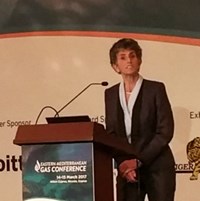EMGC '17: Establishment of EEZs would help to expedite Eastern Med gas exports
NICOSIA -- Gulf Publishing Company's Eastern Mediterranean Gas Conference (EMGC) 2017, the world's primary event for discussing the forces shaping gas industry development in the Eastern Med, continued on March 15. Sessions covered a variety of topics, ranging from predicting energy demand, to the logistics of operating gas projects and boosting regional gas supplies, to the long-term future of the Eastern Med gas market.
In the last portion of EMGC Day 2, options for regional gas ownership and export were discussed. Gina Cohen, gas consultant on the Eastern Mediterranean, and one of EMGC's liveliest speakers at past conferences, shared her perspective on energizing regional economic, business and political relationships.
Around the world, diverging views exist about what is happening with supply and demand. Cohen noted that Shell recently announced that it does not believe the world has too much LNG supply, and that any shipments that cannot find homes will end up in Europe. On the other end of the spectrum, Cohen pointed out that energy and commodities company Vitol believes that a large glut of LNG supply exists. These polarized viewpoints may be due to the companies' differing business models, she noted.
Both Israel and Cyprus' domestic markets are too small to absorb their gas reserves, so they will require export markets. Turkey and Egypt face a different scenario, as both are net importers. Discovering and producing gas in the Eastern Med is only the first hurdle; how to monetize, distribute and cooperate regionally to utilize these resources are more complicated issues, said Cohen.
In Israel, there has been much debate about how to use the gas (domestically or for export), and how to price it. The country's Leviathan development, operated by Noble Energy, may ultimately "cannibalize" some of Tamar field's contracts, as it advances amid lower development costs, said Cohen. Leviathan's second development phase will send exports to either Egypt or Jordan—"whichever country signs a contract first."
Cohen also said that she does not believe that the EastMed pipeline to Italy is financially viable, particularly with an approximate estimated cost of €5 B. However, a proposed new pipeline through Turkey could span roughly 600 km and deliver 800 MMscfd to 1,000 MMscfd of gas to the European market during its first phase. A second phase would see another 1,000 MMscfd of gas exports.
Israel is working to launch a third licensing round for its gas reserves, after several postponements.. Cohen believes that the delays were due to a lack of proposals. "We'll see, come July, how many proposals there are," she said. The consultant also outlined several options for the monetization of Eastern Med gas reserves. One option is that countries keep their gas for their own use.
"Another option is that this gas can be used to help cement regional ties," said Cohen. Or, gas reserves can lead to further regional conflict: "We could all be fighting and keeping the gas in the ground, and not achieving anything. Hopefully the companies and governments are mature enough to work together and use this gas to help cement regional ties," said Cohen.
The future of the Eastern Med. Concluding the 2017 EMGC, Gerald Butt, senior correspondent for the Middle East for Petroleum Economist, interviewed CEO Charles Ellinas of E-C Natural Hydrocarbons Co., Ltd., on reinforcing efforts to resolve conflict and promote cooperation in the Eastern Med. Butt posed the question, "If all of the region's geopolitical problems were swept away, what would that mean in terms of getting gas to market?"
In response, Ellinas answered, "I'm not so sure it would have much of an effect. It has been very difficult to find markets for the Aphrodite field, for example." He also noted that some companies have technological constraints, and a few unsuccessful wells have been drilled.
Nevertheless, Butt then asked, "What would lead to ideal cooperation in the Eastern Med?" Ellinas named agreed-upon Exclusive Economic Zones (EEZs), in every country, as the main factor that would encourage cooperation. "The oil companies are quite capable of finding gas and oil fields, and selling everything. The establishment [of EEZs] is the one thing that would help [regional cooperation]." It also would aid in potential disputes over pipeline construction and routing, the CEO noted.
Ellinas also said that he believes many people are too optimistic about Eastern Med gas development, primarily in Cyprus. "We need to have dreams, but we also need to be realists. If we are not realists, then we concentrate on things that are false, and we have wasted our time and missed our opportunities," said. Ellinas. "But we must support the foreign companies working and exploring here, and watch what happens with their developments."
EMGC 2018 will be held in March of next year at Nicosia, Cyprus. For more coverage from EMGC 2017, please see additional stories posted on World Oil’s website, or else visit our sister publications at GasProcessingNews.com and HydrocarbonProcessing.com.



